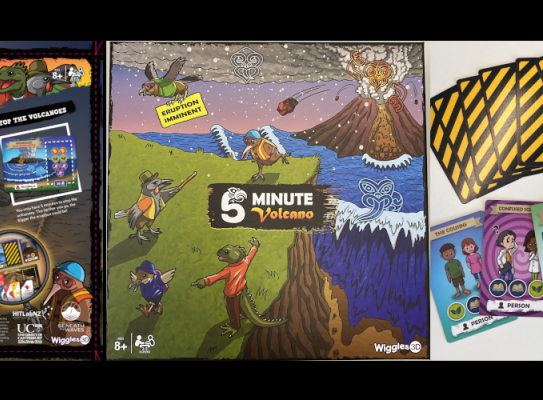5-Minute Volcano is on its way to the Science Learning Hub!

Between 28th June and 5th July, the city of Dunedin transformed into a vibrant hub of science and culture. During the festival, the Meridian Mall transformed into a lively, hands on playground where families and curious minds mingled, immersed in energetic exploration and joyful discovery.
One crowd-favourite was undoubtedly the fast-paced, card game 5-Minute Volcano, engineered to teach volcanic science and emergency preparedness in just five minutes of thrilling gameplay.
During the 5-Minute Volcano, players assume various roles such as that of a volcanologist, emergency manager, or journalist, collaborating under pressure to manage volcanic hazards portrayed by taniwha—all within a strict five minute window. The rapid-fire rounds, with simulated ashfall and rushing pyroclastic flows, are designed to spark strategy, discussion, and teamwork. One young participant beamed: "I liked how we had to do challenges." Another young player chimed in "I loved that it's collaborative. We got to play together." And that "we got to play together!" These candid reflections perfectly captured the game's heart—interactive challenges that encourage collective effort. Though aimed at ākonga aged 11–12, the gameplay was simple enough to engage children as young as eight.
Several families enquired about buying the 5-minute volcano game. Although it is not available for sale, the game is hosted on the Science Learning Hub, and local schools and libraries can reach out with their inquiries to access the game. The game has been co-developed by PhD student Kieron Wall at the University of Canterbury and has been funded by the Beneath the Waves Program at Earth Sciences New Zealand. One of the key messages of the Beneath the Waves program is that anyone can be a scientist, so showing these children that they're just as important as the adults is often encouraging and empowering.
Collaborative games like the 5-minute Volcano can make hazard education immersive, social, and reflective to effectively communicate and empower students in Aotearoa's geologically active landscape. Ph.D. student Lais Camargo Novaes shared that "our team spent four days in the NZISF, and it was nice to see how many kids and families got interested in the game, to the point of coming back the next day to play it a second or even a third time". The popularity of the 5-minute volcano games among adults and teachers also indicates the need for such resources here in Aotearoa NZ. More information about the resource can be found at Science Learning Hub, https://www.sciencelearn.org.nz/resources/5-minute-volcano(external link).